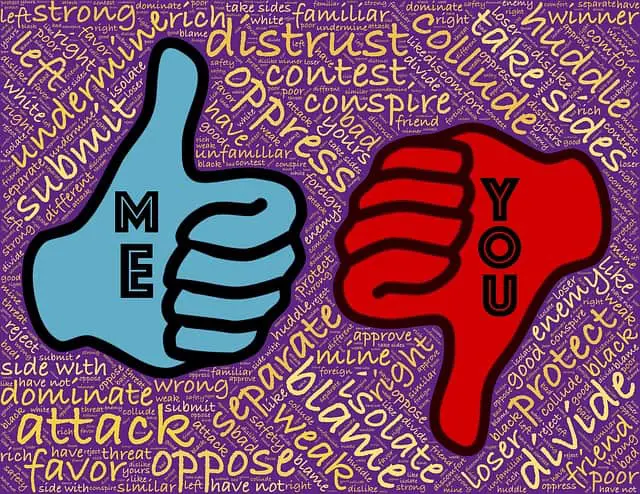What is it that defines a relationship with a psychopath versus a relationship with a normal, healthy person? How can we tell whether we are in a relationship with a fundamentally sound, decent person or whether we are caught up with a toxic, manipulative person?
As with so many things in life it comes to tuning into and trusting your intuition and gut feel, as these things will always tell you when something is wrong if you listen to them carefully enough. If something doesn’t feel right in your relationship with someone something probably isn’t right. There are also some definite signs to watch out for that indicate you may in a relationship with a psychopath.
These signs can sometimes be seen in clearer focus when they are contrasted or juxtaposed with their opposite (ie. what you would experience in a normal, healthy relationship).
This may help someone stand back a little and see whether a person is really good for them. If someone has brought all sorts of negativity into your life that wasn’t there before then you need to start asking questions.
However we also need to point out the danger of mis-diagnosis here as not all relationships are dysfunctional because they are with a psychopath. Some relationships are dysfunctional simply because two equally dysfunctional people enter them and in these cases there is blame on both sides. Other people just grow apart over time and there is no one to blame.
Similarly there are other personality disorders such as Narcissistic Personality Disorder and Borderline Personality Disorder which will produce different symptoms in a relationship and need to be handled differently.
We will not cover these here and one needs to make sure they correctly diagnose any psychological dysfunction they encounter in a relationship which means seeking appropriate professional guidance and support.
“The crucial factor that makes a relationship with a psychopath worse than even the worst breakup between two human beings, is that with the psychopath there was wilful intent to cause harm to the other person over a long period of time”
Anthony Johnson
How Psychopaths Behave in Relationships
A relationship with a psychopath takes on a whole different meaning even to a standard dysfunctional relationship once you understand how psychopaths operate.
With a psychopath, there is deliberate intent and planning to cause harm to others, often carefully thought out and premeditated over a long period of time.
This radically changes everything once you realize this about the psychopath, and makes a relationship with them fundamentally more damaging and distressful than even a relationship with an otherwise dysfunctional person who isn’t a psychopath.
This forces victims into an uncomfortable re-evaluation of the beliefs they may have held about people and the world. Most of us basically want the best for ourselves and others and think other people are broadly the same.
A relationship with a psychopath teaches us there are people who are out to specifically destroy others psychologically and plan out ways they can do this over a long period of time.
There are some common traits and patterns that characterize the way psychopaths form, and behave in, relationships with others. The following list is not exhaustive but provides some key pointers to look out for when spotting how psychopaths enter people’s lives:
- They are capable of giving off a superficial charm and charisma to initially ingratiate themselves with a person or group; they are excellent performers and can say and do all the right things initially to get themselves “in” with a person or group.
- They target high quality, decent, moral individuals and not mediocre or poor quality individuals.
- In romantic relationships they robotically produce a perfect soulmate or clone partner that is seemingly the perfect match for their target and walks and talks in harmony with them. This is a completely fake act and is designed to get the person’s trust and confidence.
- Once the honeymoon period is over, then the mind games and the identity erosion begin. They start to slowly chip away at the person’s self esteem through subtle comments and undermining. They may also begin to try isolating them from any other support systems such as friends and family by creating rifts.
- They also engage in “gas-lighting” – a gradual erosion of a person’s sense of reality and perception. They will claim things happened when they didn’t or vice versa. It is another way to chip away at a person psychologically.
- This behaviour gets progressively worse and more outrageous as the psychopath plays the long game in slowly violating the target’s boundaries more and more.
- Once this process is complete and target is completely under the psychopath’s control, they will often get bored and discard them and move onto another target. The psychopath sees the process almost like a game and after a while they get bored and move onto another someone else, whereby the process begins all over again.
- In general terms this whole cycle can be described as idealize-devalue-discard. See Jackson Mackenzie’s book Psychopath Free online for a good breakdown of this cycle. They lure a person in with a superficial charm, begin to devalue and undermine them and then discard them and move onto someone else once they get bored.

Psychopaths differ from normal people in that they actively look for opportunities to cause harm to others in relationships
Psychopathic and Normal Relationships Compared
As we said sometimes the best way to see a relationship for a psychopath for what it is is to be able to stand back and clearly compare and contrast it with it’s opposite – a functional relationship with a normal, decent, empathic person.
The extent of the gas-lighting, identity erosion and other mind games a psychopath plays with their victim can simply leave them completely confused and unable to see the obvious. They start to think that they must be the ones going insane, such is the extent the psychopath has warped and twisted their reality and undermined their perception.
Crucial to overcoming this is the ability to stand back and see things from a detached distance again.
People also need a framework to understand what is happening to them, ideally at the time and not afterwards when the damage has been done. This is why the dispersal of information on psychopathy needs to continue; hopefully this and other blogs on the topic can help in this regard.
We have embedded a table below that compares and contrasts some characteristics of a relationship with a psychopath with the opposite experience you will have with a normal, healthy relationship, or even just a flawed relationship with someone who is at least still human in the sense of being imperfect but non psychopathic.
This juxtaposing can hopefully help a person caught up in the midst of a psychopath’s nonsense to step back and see clearly what is actually going on. Here are some traits to watch out for:
Psychopath vs Normal Relationships
| Normal Relationships and People | Psychopathic Relationships |
|---|---|
| Most people are basically good and well meaning on some level | Psychopaths have no goodness in them; they are incurably evil and devoid of morality and integrity |
| Most people will play by some rules of morality and decency | Psychopaths do not play by any rules of morality or decency and have no conscience in the way they treat people |
| Normal people have some ability to empathize; to feel the emotions of another and put oneself in their shoes | Psychopaths have no ability to empathize whatsoever. |
| Any misunderstandings or arguments tend to be down to miscommunication or value differences and are not planned | Most or all conflict and abuse is carefully planned, premeditated and done on purpose by the psychopath |
| After a certain amount of trust is developed there is real connection between people | Psychopaths are unable to truly connect with anyone; they can give off an initial superficial charm but that is not the same as real intimacy or connection |
| Normal relationships are generally built on honesty and trust; there may be some lies told but the relationship is not built on lies | The relationship is characterized by constant lying and dishonesty by the psychopath; it is a case of when they aren't lying as opposed to when they are |
| At some point people in normal relationships are able to let their guard down and show the other person who they really are, warts and all. | In a relationship with a psychopath you feel like you never really know them; it feels like they are constantly acting for you and you never see who they really are |
| There are usually no agendas in normal healthy relationships; people mean what they say and there are no ulterior motives | Psychopaths constantly have agendas and ulterior motives and are constantly manipulating and looking to gain information they can later use against you |
| In normal, strong relationships you will feel uplifted and complemented by the other person. They make you feel good about yourself and support your growth | Psychopaths may bombard you with an initial charm and energy but after a while you will notice they do not lift you up but devalue you and they do not support your growth and development as a person. |
| Most people have some kind of ability to grow and change in their lives | Psychopaths are completely incapable of growth and change. They will be the exact same person when you leave them as when you met them, even after many years. |
| Normal people seek harmony, cordiality and agreement whenever possible | Psychopaths seek conflict and argument whenever possible. They manfucture arguments for no reason |

A relationship with a psychopath will leave you fundamentally more aggragavted, frustrated, irritated and unsettled than any relationship with a normal person.
Where Conventional Therapy Can Sometimes Fall Short
Drawing out this contrast between how psychopaths behave in relationships versus how normal people behave also brings out another important point that needs making, especially for people recovering from a relationship with a psychopath and still looking for answers.
Conventional therapy or counselling sometimes misses this point and it is a crucial distinction to make. It is essentially what we have been arguing this entire article but we want to state it again clearly here:
A relationship with a psychopath is fundamentally different and worse than a relationship with a normal, non psychopathic person. A psychopath is deliberately, wilfully trying to cause harm to the person over a prolonged period of time and this should fundamentally change how the relationship is viewed in therapy. It cannot be treated as “just another dysfunctional relationship” which follows the same rules as any other relationship. The issue of intent needs to be addressed and the person needs to be validated and vindicated in acknowledging the evil that was done to them by the psychopath.
Conventional talk therapy and counselling often places a huge emphasis on communication as a crucial factor in the direction relationships turn, for better or worse.
No one can reasonably argue with this and it is true that proper communication is essential to a healthy relationship. Some other general therapeutic principles may go along these lines:
- Relationship issues often stem from a lack of communication, either because it has broken down or never started in the first place.
- Conflict is usually caused by some kind of mis-match in values or beliefs.
- Focus on yourself and not the other person in picking apart a relationship, as you cannot control what someone else does or thinks. Focus only on what you can control.
- Do not speculate about another person’s intentions or motives as again this is something you don’t have direct access to.
All of these tenets are perfectly valid and reasonable but can ultimately be counter-productive when helping someone to overcome a relationship with a psychopath, simply because the issue of intent on the part of the other person is not properly addressed and even shied away from.
With a relationship with a psychopath it is crucial for both patient and therapist to realize that the source of conflict is not caused by some kind of mis-understanding, mis-matched values, “not understanding each other”, “different wavelengths” or some other cliche.
The conflict is intentionally and wilfully caused by the psychopath. They are seeking to create it on purpose.
Put differently, a well meaning person can do all the right things in a relationship with a psychopath, follow all the points we mentioned above, and it still won’t make a damn bit of difference.
The reason for this is that the psychopath doesn’t want harmony and peace; they want conflict and discord. They know full well what they are doing and they are doing it on purpose.
To state again, psychopaths do not play by the normal rules of decency and morality that the rest of humanity play by and therefore the normal rules of relationships don’t apply. You can try everything under the sun to improve the relationship; you will still find they create conflict for no reason, undermine your identity and self esteem, and never accept blame and responsibility for anything.
This problem is exacerbated by the fact that many therapists aren’t trained in extreme personality disorders such as psychopathy and sociopathy and therefore don’t have the intricate knowledge of the subject matter required to properly diagnose and provide the recovering victim with a proper conceptual framework for them to understand what happened to them and what they were up against.
In other words, many victims go through the horrific experience of a relationship with a psychopath, but remain un-vindicated about what happened to them even if they seek therapy, simply because the therapist doesn’t have the training required to properly diagnose psychopathy and provide this explanation and interpretation to the client.
Some therapists are trained in personality disorders and will make this diagnosis though given enough information, but it can be a case of luck in the sense of who the survivor goes to see that determines whether their experience will be put into the correct interpretive framework of psychopathic abuse, if it indeed meets this criteria.
See our Find a Therapist page for some excellent pointers on finding a suitably qualified and trained therapist to effectively work through the aftermath of a toxic relationship with a personality disordered individual.
There are also some excellent books and presentations on the subject that will help to fill out this knowledge gap that currently exists on the subject amongst some therapists and the general population. See our Resources page for a collection of some of these.
There are also excellent blogs on the subject of psychopathic abuse such as the Psychopath Free blog, where survivors can share stories and validate each other by gathering together common threads and shared experiences of their relationships with psychopaths.
Hopefully this blog can also contribute to the dispersal of information on this topic.
